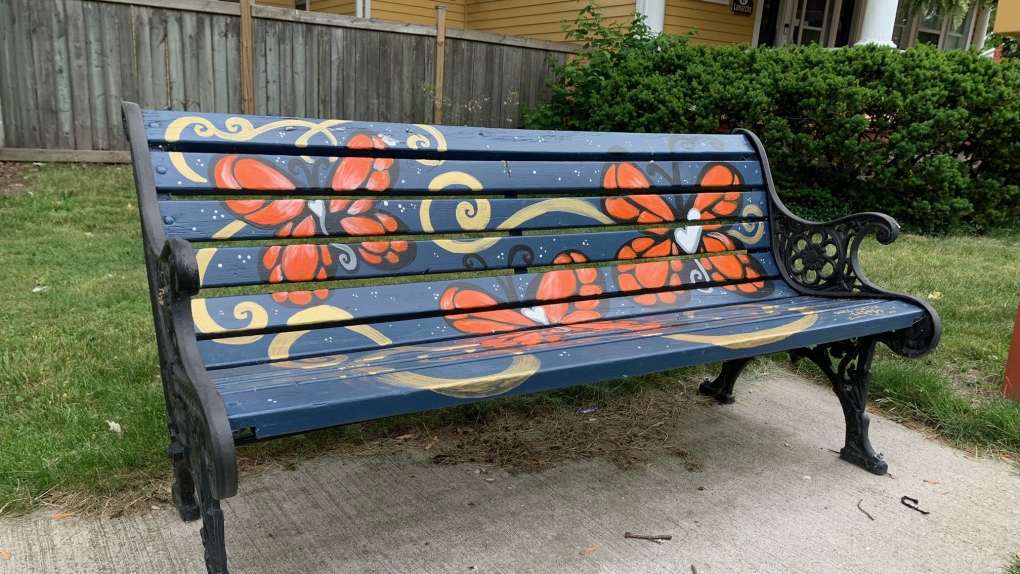Town of Kingsville abuzz with 'Bee City' designation
The Town of Kingsville has been designated a Canadian Bee City.
It means Kingsville must strive to "inspire cities, towns, First Nations, schools, businesses and other organizations to take action to protect pollinators."
“These habitats are very critical for both ourselves as people and certainly brings us all abuzz to help support the bees that are an important part of our area,” said Mayor Nelson Santos.
Kingsville was the 60th Canadian community to receive such distinction after council applied last fall. It’s also the most southernly.
As a national Bee City, the town has committed to pollinator plantings, including selecting native plants in municipal projects and making green spaces attractive to bees.
“It's an effort to provide for an environment and habitat that protects the bees, bumblebees, the butterflies and for everyone,” Santos said. “The communication with our public and the school board is natural and we're hoping that all these projects will certainly fly for us and provide a new environment for a new focus on the environment for the future.”
Bee City Canada is a program of Pollinator Partnership Canada, a federally recognized charitable organization. Officials say there are currently 63 communities across the country with such distinction, noting there’s room to grown.
“Bee City as a movement basically that helps municipalities make homes for bees,” said director Vicki Wojcik. “We all live in cities or towns and those are our homes and we take care of our homes a certain way because we like to have nice homes that make us happy. And so essentially, Bee City is exactly the same thing.”
Wojcik said other communities have held pollinator festivals, native plant giveaways or insect safaris where people go out and try to look for bees on flowers.
“When a municipality registers to be a Bee City, they're recognizing how important bees and other pollinators are to our daily lives,” she said.
Bee cities have three obligations according to Wojcik, which include initiating habitat actions, providing education and celebrating Pollinator Week, which runs June 20 to 26.
“Pretty much everything in our lives is supported by pollinators,” Wojcik told CTV News Monday, explaining that roughly a third of our diet is dependent on pollinators. “And that's not an exaggeration. It's not me trying to convince you that you should actually care about pollinators. It's the truth.”
Wojcik said anyone wanting their community to be designated a “Bee City” needs to appeal to their municipal council.
“You really have to talk to your councillors,” she said. “If you know anyone that is on city council and if they haven't already heard how great the program is, let them know and then it's up to thecouncil to pass a resolution and you could be number 64, 65, 66. Keep them coming!”
The Town of Kingsville is also recognizing 2022 as the “Year of the Garden.”
 Bench near a recently installed pollinator garden at Lakeside Park in Kingsville, Ont. on Monday, June 6, 2022. (Chris Campbell/CTV News Windsor)
Bench near a recently installed pollinator garden at Lakeside Park in Kingsville, Ont. on Monday, June 6, 2022. (Chris Campbell/CTV News Windsor)
CTVNews.ca Top Stories

B.C. tenants evicted for landlord's use after refusing large rent increase to take over neighbouring suite
Ashley Dickey and her mother rented part of the same Coquitlam duplex in three different decades under three different landlords.
Mountain guide dies after falling into a crevasse in Banff National Park
A man who fell into a crevasse while leading a backcountry ski group deep in the Canadian Rockies has died.
Expert warns of food consumption habits amid rising prices
A new survey by Dalhousie University's Agri-Food Analytics Lab asked Canadians about their food consumption habits amid rising prices.
MPP Sarah Jama asked to leave Ontario legislature for wearing keffiyeh
MPP Sarah Jama was asked to leave the Legislative Assembly of Ontario by House Speaker Ted Arnott on Thursday for wearing a keffiyeh, a garment which has been banned at Queen’s Park.
Charlie Woods, son of Tiger, shoots 81 in U.S. Open qualifier
Charlie Woods failed to advance in a U.S. Open local qualifying event Thursday, shooting a 9-over 81 at Legacy Golf & Tennis Club.
Ex-tabloid publisher testifies he scooped up possibly damaging tales to shield his old friend Trump
As Donald Trump was running for president in 2016, his old friend at the National Enquirer was scooping up potentially damaging stories about the candidate and paying out tens of thousands of dollars to keep them from the public eye.
Here's why provinces aren't following Saskatchewan's lead on the carbon tax home heating fight
After Prime Minister Justin Trudeau said the federal government would still send Canada Carbon Rebate cheques to Saskatchewan residents, despite Saskatchewan Premier Scott Moe's decision to stop collecting the carbon tax on natural gas or home heating, questions were raised about whether other provinces would follow suit. CTV News reached out across the country and here's what we found out.
Montreal actress calls Weinstein ruling 'discouraging' but not surprising
A Montreal actress, who has previously detailed incidents she had with disgraced Hollywood producer Harvey Weinstein, says a New York Court of Appeals decision overturning his 2020 rape conviction is 'discouraging' but not surprising.
Caleb Williams, Jayden Daniels and Drake Maye make it four NFL drafts with quarterbacks going 1-3
Caleb Williams is heading to the Windy City, aiming to become the franchise quarterback Chicago has sought for decades.

































